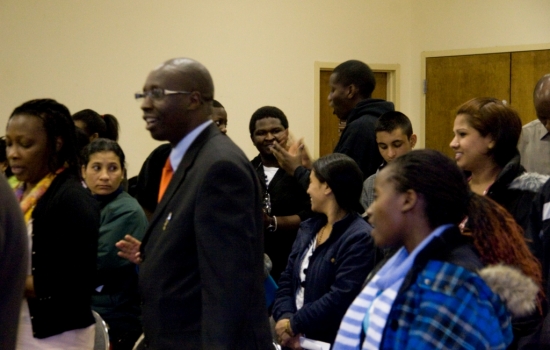Copyright © TMS Global
TMS Global
PO Box 936559
Atlanta, GA 31193-6559
800.478.8963
Our EIN number or Taxpayer Identification Number is 58-1546441.

Reid and Lola Buchanan lived and ministered in Ghana for six years before moving back to the United States. They minister in Lexington, Kentucky and they continue to coordinate Community Health Evangelism (CHE) programs in Ghana. Lola serves as a Home Health Nurse, and Reid is introducing the urban CHE model of ministry called Neighborhood Transformation. Trained as a civil engineer, Reid earned a master's in World Mission and Evangelism from Asbury Theological Seminary. He is an ordained deacon in the Kentucky Annual Conference of The United Methodist Church.
Reid and Lola have two grown sons and adopted two orphaned girls from Ghana.
Reid Buchanan was walking out of a grocery store in Lexington, Kentucky when a woman approached him for help with her car. She recognized Serwaa, Buchanan’s adopted daughter, as a Ghanaian. The woman identified herself as Ghanaian and began to speak to Reid in Twi (the language of the Ashanti tribe).
“In our brief encounter, this woman indicated that she was not comfortable worshipping in the churches in Lexington. She would often drive 90 minutes to worship at a multicultural service in another city,” said Buchanan. “It was through that conversation that I started thinking about starting a worship service for immigrants and refugees.”
The Buchanans attend St. Luke United Methodist Church where Reid is director of “building relationships and introducing Christ” for the church. Buchanan approached the senior pastor of St. Luke, Dr. Debbie Wallace-Padgett, about starting a new service. In October 2009, the vision was shared with the church staff, who enthusiastically supported the idea.
During the fall of 2009 and early 2010, demographic information was collected and a focus group was formed and began meeting. The focus group consisted of a Ghanaian couple, a Congolese teacher, a doctoral student from Kenya who was attending Asbury Theological Seminary, a nurse from Sierra Leone, Reid and Lola Buchanan, and the worship coordinator from St. Luke. Their research showed that there were around 2,000 immigrants and refugees from Africa, Asia, and South America in the Lexington area.
The Rev. Harun Gatobu, a Kenyan United Methodist pastor, was appointed part-time to St. Luke as pastor of the Multicultural Ministries in June 2011. He and his family moved from Kenya to the United States three years earlier.
The weekly service launched on February 19, 2012. The first Sunday, more than 100 people from 20 countries gathered together. The service included scripture readings in French (the language of many African nations), Congolese dancing, music, drums, and a sermon in English by the Rev. Gatobu. Attendees included people from Ghana, Kenya, Malawi, Nigeria, Uganda, Congo, Bhutan, Mexico, the United States, and other countries. The service has had an average of 60 people each week since its launch.
One participant, Krishna, was placed in Lexington in September 2011 by the United Nations High Commission for Refugees (UNHCR). Krishna, her husband, and three children lived in a Bhutanese refugee camp in Nepal for many years. “Life in the camp was very difficult, particularly for women. The bamboo huts often could not withstand the torrential downpours of the monsoon. The rations of rice, lentils, oil, salt, vegetables, and kerosene provided (by UNHCR) were far from sufficient. Life was so uncertain that we had to live each day as it came,” said Krishna. “It pains me to be called a refugee.” Around 42,000 Bhutanese refugees have been relocated to the United States, according to UNHCR.
Krishna started attending an ESL class that Buchanan organized in partnership with St. Luke and Kentucky Refugee Ministries. “The English class gives us hope. The new church service offers us a sense of community,” said Krishna.
“Several other women have found jobs through the ESL class as well,” said Buchanan.
As more and more refugees are resettled across the United States, Christians have an unprecedented opportunity to witness to many people groups considered least reached. The goal of this multicultural service is to offer something familiar to refugees who have left everything. “My hope and prayer for the multicultural worship service is that we offer Christ to all, that we live and share in community, and celebrate in worship,” said Buchanan.